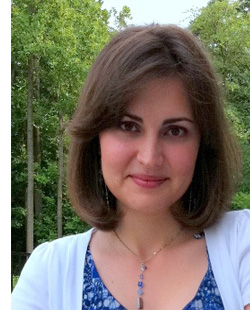
During my childhood in Russia, my family moved quite often and I was exposed to many lifestyles and opinions. When I got to university, I knew I wanted to continue to broaden my horizons.
Deciding to study abroad
I enjoyed studying at Lomonosov Moscow State University, where I completed my specialist degree (equivalent to the master’s degree in the United States). As the oldest university in Russia, it is an excellent school with a rich history. But for the next phase of my education, I wanted to learn about the lives of students in other countries and experience a different education system. As an undergraduate student working in a research group for the first time, I was also very excited about experimental research. With these ideas in mind, I decided to apply for graduate school overseas.
Finding useful information
Applying for graduate school in another country may sound simple, but the process is actually quite complicated when you lack knowledge and resources. To learn more, I attended summer and winter schools and international conferences. These events allowed me to meet new people and get their advice about making my plans a reality, while at the same time staying abreast of research being done all over the world.
Because of the distance between Moscow and the rest of Europe, it can be difficult for Russian students to attend scientific meetings abroad. Travel is expensive and young scientists’ salaries are not very high. However, I received a number of travel awards to help with the cost. There are many opportunities for awards like these in developing countries, and summer schools and programs offer travel grants. It just takes effort and dedication to find them.
Applying for programs
I learned a great deal from the people I met at conferences, as well as from Internet research. To apply for graduate school in the United States, I had to take the TOEFL and the GRE General and Physics exams. I was also required to submit many documents, including my transcripts and diploma, which had to be translated. The second half of 2009 was one of the most stressful times in my life. At the same time that I was finishing my studies in Russia, I had to prepare for and take a whole other set of exams and compile all my official documents. Taking exams in a foreign language was an additional challenge.
Studying in the United States
Fortunately, my efforts paid off, and I am currently pursuing my Ph.D. at the University of Maryland in College Park. I have a job that I like and a decent stipend. Although I was aware that there would be differences between studying in the United States and Russia, I didn’t realize how dramatic they would be. In Russia, students have up to 10 classes during the semester, in contrast to only two to three classes in the United States. This generally means that American students have a greater depth of knowledge in certain areas, whereas Russians gain a more universal perspective on physics.
U.S. students have the freedom to choose many of their own classes, whereas in Russia, all students of the same year in a given department must follow the same curriculum. Perhaps the most important difference is that American graduate schools combine the master’s and doctoral curricula, and so students spend five to six years in one school, whereas Russian and European programs are separate. This gives students the opportunity to move between research groups as their careers progress.
Coming to the United States for graduate school has been a great opportunity to learn about a country and people very different from my own. I believe that this cultural exploration is the greatest learning experience that I have had in graduate school. Studying abroad will help you to discover what your values really are. The practical, day-to-day differences between graduate programs will seem minor in comparison to the broad new perspective you will gain.
Zuleykhan Tomova (ztomova@umd.edu) is a Ph.D. student at the University of Maryland, College Park, Md., U.S.A and International Coordinator of IONS Project.
